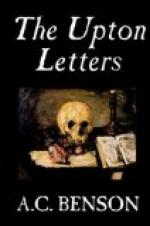Again, I know no writer who has caught the poetry of the hearth like Charlotte Bronte. The evening hours, when the fire leaps in the chimney, and the lamp is lit, and the homeless wind moans outside, and the contented mind possesses its dreams—I know nothing like that in any book.
Indeed, I do not know any books which give me quite the sense of genius that Charlotte Bronte’s bring me. I find it difficult to define where the genius lies; but the love which she dares to depict seems to me to have a different quality to any other love; it is the passionate ardour of a pure soul; it embraces body, mind, and heart alike; it is a love that pierces through all disguises, and is the worship of spirit for spirit at the very root of being; such love is not lightly conceived or easily given; it is not born of chance companionship, of fleshly desire, of a craving to share the happiness of a buoyant spirit of sunshine and sweetness; it is rather nurtured in gloom and sadness, it demands a corresponding depth and intensity, it requires to discern in its lover a deep passion for the beauty of virtue. It is one of the triumphs of Jane Eyre that the love she feels for Mr. Rochester pierces through those very superficial vices which would be most abhorrent to the pure nature, if it were not for the certainty that such vice was the disguise and not the essence of the soul. And here lies, I think, the uplifting hopefulness of Jane Eyre, the Christ-like power of recognising the ardent spirit of love behind gross faults of both the animal and the intellectual nature.




